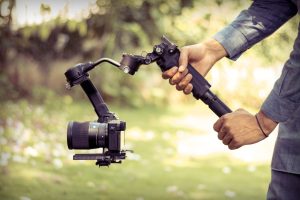
A camera operator is a person capturing footage for a production. They capture the action on their cameras, making sure that the shot is framed well, the camera is focused, the composition and light balance on the camera are all correct.
They are required for different types of production – from broadcast tv to corporate film. Camera Operators may specialise in certain genres but are generally able to adapt to different shooting styles as the basics are the same across the board.
Depending on the production, this may be a multi-cam shoot where there are multiple camera operators, or it may be a single-camera shoot where there is just one. Some productions require the camera operator to capture sound or to be able to set up lighting, so most camera operators have a basic understanding of these things.
What are some of their responsibilities?
• Checking SD card for faults – making sure that the SD card can capture the footage, sometimes they may choose to carry a spare for emergencies
• Discussing shooting requirements with directors and producers
• Help the production crew set up equipment and space
• Making sure the camera is on the right settings – resolution and frame rate vary by region
• Framing shots and capturing shots as directed– they must be able to know what looks good in a shot, the rule of thirds, and placement of objects make a difference to a viewer when capturing footage
• Producing footage according to shooting schedules and call sheets – there is a timeframe in which everything is scheduled to be shot, and going over schedule is costly to a budget
• Ensuring focus – being able to make sure the camera is always in focus
• Light balancing – being able to white-balance the camera and make sure the light levels are correct, that it is not either too bright or too dark, or too warm or too cold
• Capturing footage – this may be by hand, on a tripod or sometimes a steady-cam and may require movement
• Capturing sound – the basic ability to capture sound, either on the camera or a basic microphone set up
• Setting up Lighting – knowing basics of lighting and different lighting set ups and being able to set up basic lighting for a shoot
Who do Camera Operators work alongside?
• Producers
• Directors
• Sound Recordists
• Gaffers
• Grips
• Camera Assistants
What makes a great Camera Op?
Camera operators should understand the technical knowledge of different popular cameras in the industry, they should have an in-depth understanding of the latest motion picture equipment, lenses, monitors, and lights in the industry and be able to assess what is best for differentiating productions. Something worth knowing is the Editing process – although you may not need to use it, it helps to know how things work to understand how the end result should look.
It is best if you have your own equipment as some companies may request what equipment you have but if you do not have your own equipment, there are rental houses that are able to provide equipment for you.
How to become a Camera Operator?
• It is not essential to have a degree to become a camera operator. There are, however, degree courses that specialise in television production and photography that you might consider as this enables a better understanding of the industry before you go into it. (https://www.ravensbourne.ac.uk/study/undergraduate/ba-hons-digital-television-production)
Networking
There are different ways to network –
• Attending events is a fantastic way to meet people in person
• LinkedIn – make connections!
• Facebook Pages – join a group and they will post jobs and advice!
• Talk to previous clients about extra work – sell yourself!
Work Experience
• Different production companies may offer work experience opportunities to build up your CV, enquire with them to see if they offer anything that may help!
Courses
• Companies such as ScreenSkills offer training with all sorts of roles – ScreenSkills have a great reputation among training centres and have been known to be recommended during university degrees for extra learning: https://www.screenskills.com/training-and-opportunities/?q=Camera
Showreel
• A visual representation of your work helps to sell yourself – Vimeo or YouTube are great platforms for a showreel
• If you don’t have much footage to put into a showreel, you can use clips you shot on your phone to get small clients and from there you can build your showreel up for bigger clients
How do I book a Camera Operator?
If you would like to enhance your project, here at Yellow Cat we have a wide network of talented Camera Operators to suit all client needs. We have a rich talent pool for client’s to hire freelance Camera Ops.